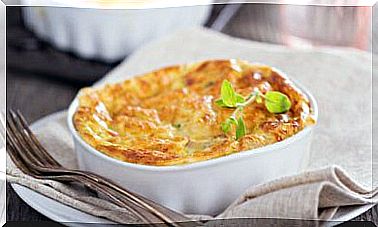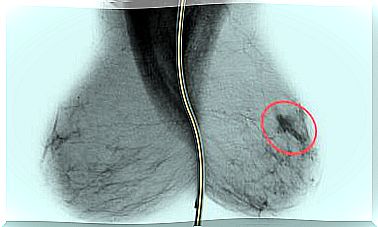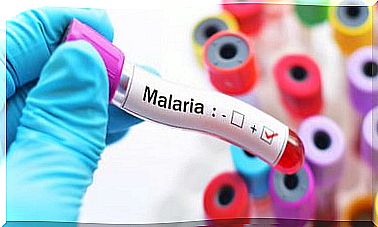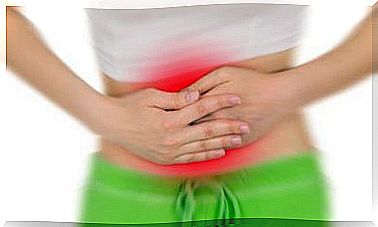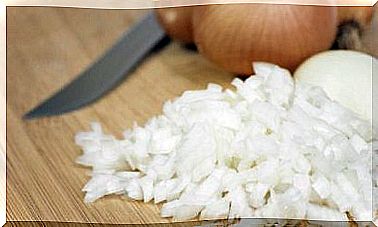Pollen: Properties, Use And Benefits
Despite not being very well known, pollen is a superfood with very complete nutritional values and beneficial for health. Among these, its ability to improve physical and intellectual performance, raise defenses and combat nutritional deficiencies stand out.
In this article, we explain what pollen is, what its benefits are and how to take it so that the body assimilates it well. In addition, some therapeutic formulas are listed that will help you overcome various health disorders.
What is pollen?
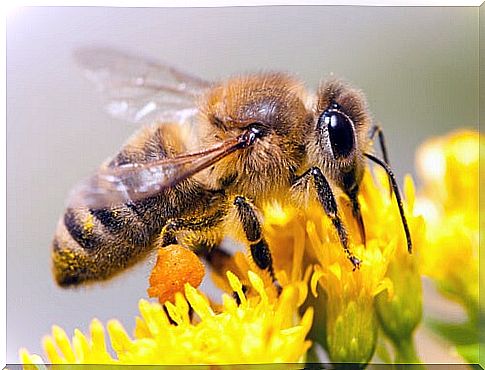
Pollen is a food that is collected from the hive of bees, which take it from plants and transport it to their honeycomb in the form of orange granules that they make themselves. It stands out for containing almost all the nutrients that humans need; it is the only food that contains all 22 essential amino acids.
Nutritional properties of pollen
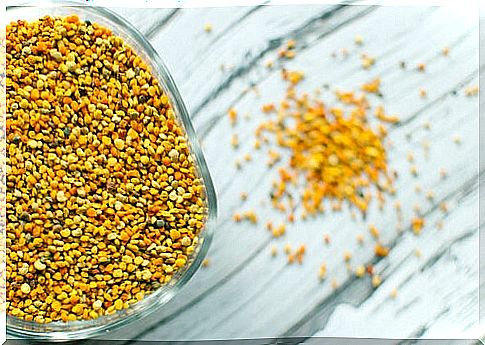
Pollen contains a large amount of nutrients. Among them are:
- Vitamins A, D, E, B1, B2, B6, nicotinic acid, panthenic acid, C, K, choline and rutin. It is one of the richest foods in vitamins that exist.
- Minerals such as trace elements : sodium, potassium, magnesium, calcium, aluminum, iron, copper, zinc, manganese, lead, silica, phosphorus, chlorine and sulfur.
- Enzymes: diastase, amylase, catalase, diaphorase, pectase, lactic dihydrogenase, phosphatase and sucrose.
- Amino Acids: Alanine, Arginine, Cystine, Glycine, Histidine, Isoleucine, Lysine, Phenylalanine, Tryptophan, etc.
On the other hand, pollen contains approximately 25% protein and 4% fiber.
Health benefits of pollen

The daily consumption of pollen brings the following benefits to our health:
- Increases physical endurance, reduces fatigue and facilitates recovery after convalescence.
- Improves cerebral irrigation and intellectual capacity.
- Regulates the nervous system, improves mood and reduces stress.
- Improves the digestive system and fights poor appetite; in addition, it favors and regenerates the intestinal bacterial flora.
- Improves vision, thanks to its riboflavin content.
- Stimulates the immune system and raises the defenses.
- Compensates for hypotension gradually and naturally.
- It favors the development and growth of children.
- Regulates triglyceride and cholesterol levels in the blood and balances blood pH.
- It is an excellent protective supplement for cancer patients undergoing chemotherapy or radiation therapy.
- Improves sexual potency and combats impotence and frigidity.
- Improves the circulatory and cardiovascular system.
- Reduces inflammation of the prostate or prostatitis, thanks to its content of zinc and sex hormones.
- It stops hair loss in some cases, thanks to its cystine content, a nutrient that increases the hair system.
- Fight allergic rhinitis, long term.
How is pollen taken?
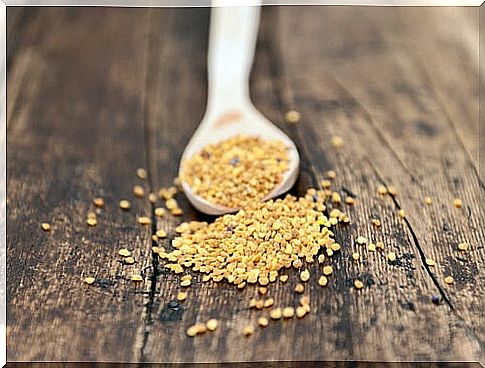
Pollen is a food that, if consumed whole, our body does not digest or assimilate it, so we would not obtain any health benefits. Therefore, it is very important to always eat it in powder or liquid extract.
As pollen is usually sold in granules, we can grind it ourselves to take it mixed, for example, with one of the breakfast foods. Many naturopaths and nutritionists recommend taking pollen regularly in times of change of season, especially in spring and fall.
Recommended amounts
We can start consuming pollen in reduced quantity, to see how our body tolerates it, and gradually increase it. These are the recommended daily doses of pollen for adults and children according to their age:
- Adults: Two teaspoons (16 g) of pollen powder as a treatment and a teaspoon and a half (12 g) as maintenance.
- Children 3 to 5 years: One level teaspoon (4 g) as a treatment.
- Infants 6 to 12 years: One teaspoon (8 g) as a treatment.
- Children over 12 years: Two teaspoons (16 g) as a treatment.
We can take the pollen for 20 days in a row and rest the next 10, and repeat according to the needs of our body. The best time of day to consume it is in the morning, on an empty stomach.
Specific formulas with pollen
Here are some pollen formulas with therapeutic results for different health problems. In any case, it is always recommended to consult a doctor if we suffer from any disease or take medication, since there may be important contraindications:
- Alzheimer’s: Tincture of propolis, ginkgo biloba and pollen. To take in seasons alternated with periods of rest.
- To improve cerebral irrigation: If we want to improve blood circulation in the brain, to combat concentration or memory problems or the effects of stress, we can take pollen together with propolis, ginseng, rosemary and butcher’s broom.
- Anemia: To end anemia in the most natural way we can prepare each day a salad of green leaves with alfalfa sprouts and ground pollen dressed with olive oil, fresh lemon juice and a pinch of sea salt.
- Cancer: To prevent cancer and even strengthen the defenses if you already have this disease, we can take pollen, propolis, milk thistle, pink lapacho, shiitake and cat’s claw.
- Hypotension: To raise the tension slightly, especially in hot weather when we feel dizzy and without energy, we can consume pollen and rosemary, one or the other, or combine them if necessary.
- Lack of appetite: For those who suffer from lack of appetite or even for children who find it difficult to eat, pollen is highly indicated, along with yarrow, cinnamon and ginger, which stimulate gastric juices.
Pollen against pollen allergy
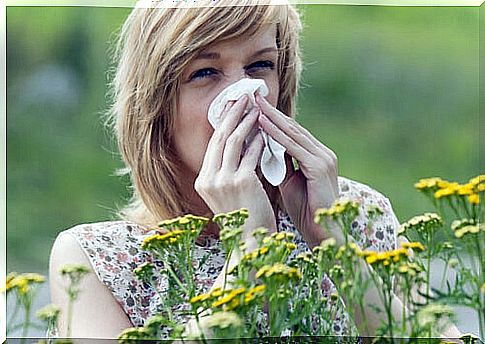
An old remedy tells that, if our body does not react well to spring pollen, we can take chewed pollen granules very gradually, as one granule per day. With this, our body will get used to the pollination of plants.
In this sense, pure honey, which also contains pollen in very small amounts, can also be a food that helps us minimize the allergic reaction if we consume it regularly.
Curiosities about pollen
To conclude, we also include some striking facts about this food:
- Pollen has three times as much protein as meat.
- Beekeepers who consume pollen on a daily basis have proven to be longer-lived.
- To collect 1 kg of pollen, the bee has to make more than 60 thousand flights to the hive.
- By collecting pollen, bees ensure the pollination of most flowers, as well as the ripening of their fruits.
Finally, to underline the importance of this element of nature, it should be said that 75% of the world’s diet depends precisely on this pollinating activity of the honey bee, the only one responsible for this task.

